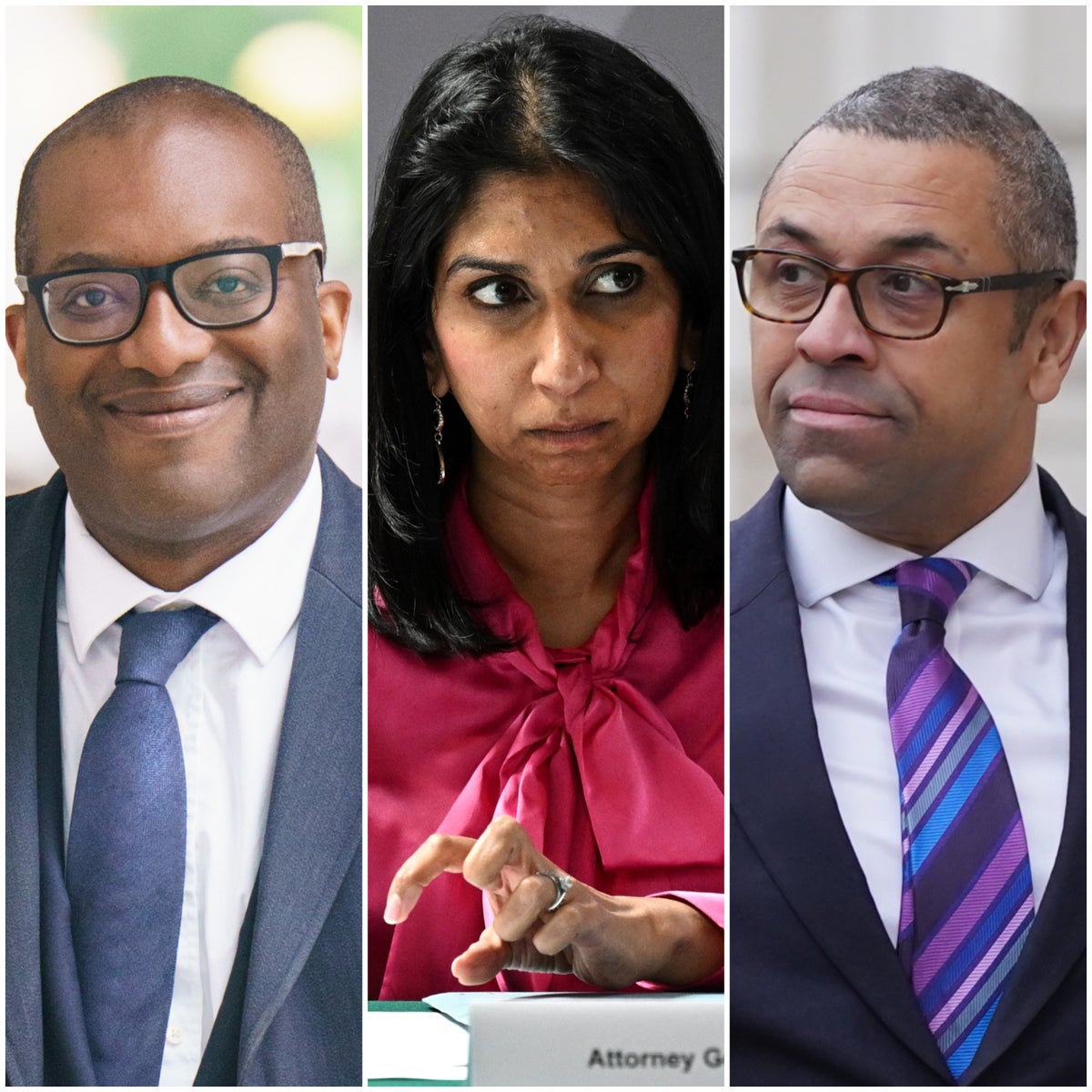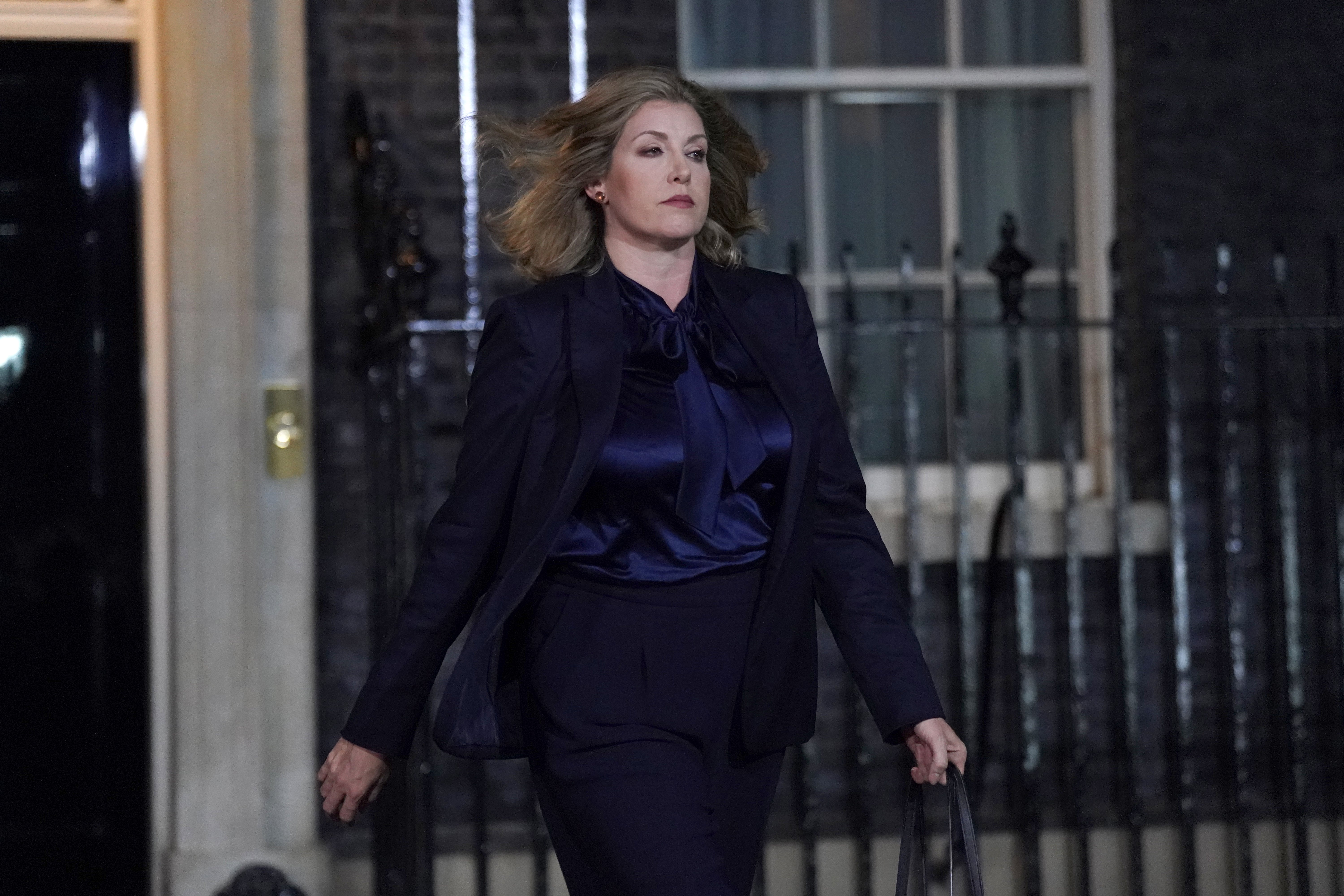
Liz Truss rewarded close allies Kwasi Kwarteng and Therese Coffey with top Cabinet jobs as she culled a number of prominent Rishi Sunak supporters during a major Government reshuffle.
The new Prime Minister appointed Mr Kwarteng as Chancellor and Ms Coffey as Deputy Prime Minister and Health Secretary, as she made James Cleverly her successor as Foreign Secretary on Tuesday.
Former attorney general Suella Braverman was appointed Home Secretary, meaning that for the first time in history none of the great offices of state are held by white men.
Jacob Rees-Mogg, the hardline Brexiteer who has decried “climate alarmism”, was appointed as Secretary of State for Business, Energy and Industrial Strategy.
First Ms Truss despatched former deputy PM Dominic Raab and cabinet colleagues Grant Shapps, George Eustice and Steve Barclay to the backbenches after they supported her rival in the Tory leadership contest.
Ms Coffey, the former work and pensions secretary who is regarded as the Prime Minister’s closest friend in Westminster, replaced Mr Raab as the second in command after he described Ms Truss’s tax plans as an “electoral suicide note”.
And she took on Mr Barclay’s health brief after he too came out in support for Mr Sunak, the former chancellor who Ms Truss beat in a poll of Tory members.
Mr Kwarteng, a long-term ally of Ms Truss’s, entered the Treasury to replace Nadhim Zahawi, who was appointed Chancellor of the Duchy of Lancaster in the Cabinet Office after his doomed attempt at the leadership.
Kemi Badenoch, who was popular among the Tory party’s right during her failed leadership bid, was made International Trade Secretary.
Brandon Lewis, whose resignation as Northern Ireland secretary piled pressure on Boris Johnson to resign from No 10, replaced Mr Raab as Justice Secretary.
Mr Lewis, who once admitted a piece of Brexit-related legislation would break international law “in a very specific and limited way”, ultimately backed Ms Truss in the leadership contest.
Kit Malthouse, a dogged ally of Mr Johnson, was made Education Secretary.
Simon Clarke, who played a key role in the Truss campaign, was promoted from being a Treasury minister to Levelling Up, Housing and Communities Secretary, while Chloe Smith became Work and Pensions Secretary.
Penny Mordaunt, who failed to make it into the final stage of the leadership contest after a jump in support for Ms Truss among Tory MPs, was appointed Leader of the House of Commons.

Fellow former leadership contender Tom Tugendhat got his first Government job, attending Cabinet as a security minister.
Ms Truss’s press secretary insisted the inclusion of five leadership rivals in her top team shows it is a Cabinet that “will unify the party, get our economy growing and deliver for the British people”.
Jake Berry, the Truss-backing chairman of the Northern Research Group of Tory MPs, returned to Government after a two-year absence as minister without portfolio.
Ben Wallace will continue in the role of Defence Secretary, as he plays a vital role in supporting Volodymyr Zelensky in Ukraine’s fight against Vladimir Putin’s invasion.
Former transport minister Wendy Morton will attend Cabinet as chief whip, making her responsible for party discipline in the Commons.
Ms Truss was remaking the top of Government in her own image from No 10, after she began the sackings in her House of Commons office shortly after making her first speech as PM.
Mr Raab, who was justice secretary as well as second in command to Mr Johnson, had not expected to continue his run in Government, having been a vocal critic of Ms Truss.
The MP for Esher and Walton said: “I look forward to supporting the Government from the backbenches.”
Mr Shapps, who was replaced by former international trade secretary Anne-Marie Trevelyan, also tweeted his own exit as Transport Secretary but did not make the same remarks of support for the new Tory leader.
Instead, the Welwyn Hatfield MP said he looks forward to being “a strong, independent voice on the backbenches”.
Mr Eustice pledged to “offer scrutiny” from the backbenches as the Camborne and Redruth MP was sacked as environment secretary and replaced by trade minister Ranil Jayawardena.
Former chief whip Chris Heaton-Harris was appointed Northern Ireland Secretary, replacing Mr Sunak backer Shailesh Vara.
Mr Barclay, the MP for North East Cambridgeshire who had been health secretary for Mr Johnson’s final months in office, wished Ms Truss “every success for the future”.
Priti Patel, who did not endorse any candidate, announced her departure on Monday before Ms Truss entered No 10 after her Home Office job was publicly linked with Ms Braverman.
Ms Braverman also ran for the Tory leadership, decrying what she termed “woke rubbish” and pledging to take the UK out of the European Convention on Human Rights.
Johnny Mercer, who did not say who he was backing in the race, said he was “disappointed” to be sacked as veterans’ affairs minister, but accepted the Prime Minister is “entitled to reward her supporters”.
The Plymouth Moor View MP also suggested he could quit the Commons, before his wife Felicity Cornelius-Mercer branded Ms Truss an “imbecile”.
Earlier, Nadine Dorries, who had backed Ms Truss, confirmed that she had been asked to stay on as culture secretary but had decided that she also would be returning to the backbenches.
She was replaced by Michelle Donelan, who spent 36 hours as Mr Johnson’s education secretary before resigning in his final hours before he agreed to stand down.
Mr Sunak, the former chancellor whose resignation helped trigger the downfall of Mr Johnson, has also made clear he did not expect to be offered a new job.
His supporters, however, have been urging Ms Truss to appoint an “inclusive” Cabinet and not simply surround herself with loyalists in the way that Mr Johnson was accused of doing.







